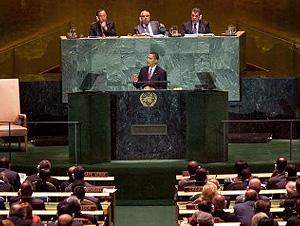The UN General Assembly: The greatest show on earth
US President Barack Obama spoke in front of the UN General Assembly on September 23, 2009. (Image: White House Photo, Samantha Appleton)
The following is not a full transcript; for full story, listen to audio.
The United Nations General Assembly convened in Manhattan this week, and everyone came. Libyan leader Moammar Gadhafi wowed the crowd with a suggestion that the United Nations Security Council be renamed the “Terror Council”; while Iranian President Mahmoud Ahmadinejad caused a walk-out by many delegations.
“The Takeaway’s” John Hockenberry took a look at the purpose of this global forum for world leaders in the 21st century. Is it reasonable to expect gravitas from the U.N., or is it just a just a way to bring together “the greatest show on earth?”
This is what he came up with:
The list of public forums that have changed history is a short one: The Roman Senate, the British Parliament, the US Senate, the Soviet Politburo and the Chinese People’s Congress.
But for global diversity, you can’t beat the United Nation’s General Assembly.
“Without peace, all our dreams vanish and are reduced to ashes,” said Indian Prime Minister Nehru in front of the UN General Assembly in 1960. He was then leader of the largest democracy in the world, and also the leader of the then so-called developing world.
Much has changed since then — India is an industrial democracy, while once superpower France is now something less than super.
France’s President, Nicolas Sarkozy said in his speech yesterday in front of the General Assembly [through translator]: “We are right in the middle of an unprecedented financial and economic crisis. We are on the threshold of a planetary ecological disaster. We must right now, invent a new world where the follies of yesterday will no longer be possible.”
Apparently France becoming a nuclear power might be considered one of those follies.
This week’s speeches at the UN were dominated by references to nuclear proliferation. Said US President Barack Obama in his speech: “In their actions to date, the governments of North Korea and Iran threatened to take us down this dangerous slope.”
All 192 world leaders get to speak before the General Assembly. And they come each with their own pet issues.
For Swedish Prime Minister Fredrik Reinfeldt it was free trade: “Globalization is good. Through globalization, hundreds of millions of people have been lifted out of poverty.”
Lee Myung-bak, South Korea’s President, focused on climate change and developing green industries [through translator]: “Thereby we will not only transform our economic and industrial structures, but also change our very lifestyles to become more future-oriented.”
Getting his first speech in front of the General Assembly was Libyan leader Moammar Gadhafi. He had a lot of pet issues in his rambling 90-minute speech: the release of former Panamanian dictator Manuel Noriega; an investigation into the Vietnam and Korean wars; he insisted on $7.7 trillion dollars in reparations for African nations which had been colonized; and swine flu, Gadhafi said, is a biological weapon gone mad.
But he made history by being the first leader to discuss his own conspiracy theory about the Kennedy assassination [through translator]: “The assassination of Kennedy in ’63 or ’62, president of the United States of America — why? We want to know who killed him.”
The Warren report? Nonsense. The Gadhafi report? Well, all trails lead to an obvious culprit: “Jack Ruby, and Israeli, killed Lee Harvey Oswald, who killed Kennedy …”
One week, 192 speeches. Our little planet has only one global forum: the UN General Assembly. It may not always be pretty, but it’s all we’ve got for now.
In case you missed Libyan leader Moammar Gadhafi’s speech, here it is:
“The Takeaway” is a national morning news program, delivering the news and analysis you need to catch up, start your day, and prepare for what’s ahead. The show is a co-production of WNYC and PRI, in editorial collaboration with the BBC, The New York Times Radio, and WGBH.
Every day, reporters and producers at The World are hard at work bringing you human-centered news from across the globe. But we can’t do it without you. We need your support to ensure we can continue this work for another year.
Make a gift today, and you’ll help us unlock a matching gift of $67,000!
